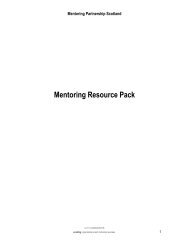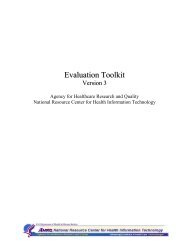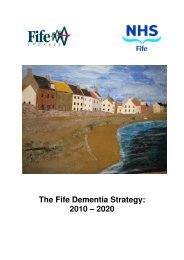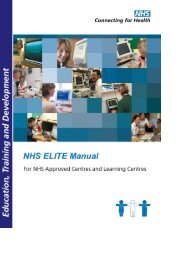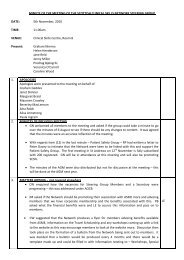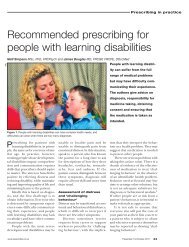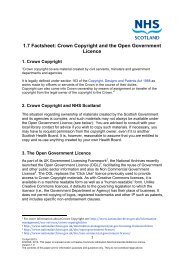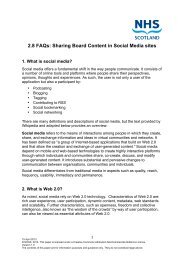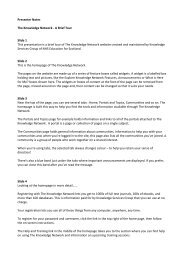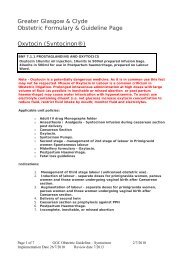Sharing information for health and social care
Sharing information for health and social care
Sharing information for health and social care
You also want an ePaper? Increase the reach of your titles
YUMPU automatically turns print PDFs into web optimized ePapers that Google loves.
In<strong>for</strong>mation Partnership Training<br />
<strong>for</strong> shared decisions in <strong>health</strong> <strong>and</strong> <strong>social</strong> <strong>care</strong><br />
1<br />
<strong>Sharing</strong><br />
<strong>in<strong>for</strong>mation</strong><br />
<strong>for</strong> <strong>health</strong> <strong>and</strong><br />
<strong>social</strong> <strong>care</strong>
In<strong>for</strong>mation Partnership Training<br />
<strong>for</strong> shared decisions in <strong>health</strong> <strong>and</strong> <strong>social</strong> <strong>care</strong> 2<br />
Everyone who shares <strong>in<strong>for</strong>mation</strong> can make a<br />
difference - whether it is being responsible <strong>for</strong><br />
leaflets/posters in a reception area, signposting<br />
people to services or helping people access<br />
<strong>in<strong>for</strong>mation</strong> on-line. In all these cases, “good”<br />
<strong>in<strong>for</strong>mation</strong> is important. We will talk more<br />
about what makes ‘good’ <strong>in<strong>for</strong>mation</strong> in the<br />
next section.<br />
Your values <strong>and</strong> attitudes, or how you think<br />
<strong>and</strong> act will also make a difference to the<br />
experience of the person you are working with<br />
<strong>and</strong> the quality of <strong>in<strong>for</strong>mation</strong> they receive.<br />
You are in a role where you can actively<br />
challenge <strong>health</strong> inequalities <strong>and</strong> really make a<br />
difference to individuals.<br />
1.1 How do you share <strong>in<strong>for</strong>mation</strong>?<br />
Many people working in a wide range of settings share<br />
<strong>in<strong>for</strong>mation</strong> as part of their job. For example: staff <strong>and</strong><br />
volunteers working in NHS community settings, housing,<br />
libraries, advice agencies, <strong>social</strong> <strong>care</strong>, arts <strong>and</strong> leisure,<br />
community education, community centres <strong>and</strong> projects.<br />
Now we want you to think about how you share <strong>in<strong>for</strong>mation</strong>, so<br />
you can relate what follows in the pack to your situation.<br />
ACTIVITY 1A<br />
Take five minutes to think about how you share<br />
<strong>in<strong>for</strong>mation</strong>.<br />
• What do you do?<br />
• Who do you give <strong>in<strong>for</strong>mation</strong> to?<br />
• How do you think your <strong>in<strong>for</strong>mation</strong> helps?<br />
Discussion points<br />
Some of the things you might have covered are:<br />
• what <strong>in<strong>for</strong>mation</strong> you provide in your job role<br />
• what the role of giving <strong>in<strong>for</strong>mation</strong> means to you<br />
• who you give <strong>in<strong>for</strong>mation</strong> to<br />
• what kind of <strong>in<strong>for</strong>mation</strong> you give<br />
• how you think your <strong>in<strong>for</strong>mation</strong> helps<br />
• what challenges there are e.g. some people may miss out<br />
on <strong>in<strong>for</strong>mation</strong>; you may not always have time to give to<br />
this role.<br />
1<br />
<strong>Sharing</strong> <strong>in<strong>for</strong>mation</strong> <strong>for</strong> <strong>health</strong> <strong>and</strong> <strong>social</strong> <strong>care</strong>
In<strong>for</strong>mation Partnership Training<br />
<strong>for</strong> shared decisions in <strong>health</strong> <strong>and</strong> <strong>social</strong> <strong>care</strong> 3<br />
1.2 What do you need to share <strong>in<strong>for</strong>mation</strong> effectively?<br />
Because job roles are very different, there is no one “checklist”.<br />
The chances are that each person who shares <strong>in<strong>for</strong>mation</strong><br />
needs a mixture of:<br />
• Practical skills <strong>and</strong> abilities - things you need to be able<br />
to do<br />
• Personal qualities, attitudes <strong>and</strong> values - what you as a<br />
person bring to the job<br />
ACTIVITY 1B<br />
What practical skills <strong>and</strong> abilities do you need when<br />
you share <strong>in<strong>for</strong>mation</strong>? List these <strong>and</strong> think why<br />
you need them.<br />
(Remember there is no one correct list.)<br />
Discussion points<br />
Some of the things you might have covered are:<br />
• Listening attentively <strong>and</strong> not interrupting<br />
• Identifying what people need <strong>and</strong> the best way to help<br />
them<br />
• Explaining things clearly<br />
• Explaining jargon or technical terms<br />
• Organising materials (keeping things up to date, in good<br />
order, looking inviting)<br />
• Searching the Internet/using NHS in<strong>for</strong>m<br />
• Checking people underst<strong>and</strong> the <strong>in<strong>for</strong>mation</strong><br />
Some reasons you think you might need these skills:<br />
• You want to make sure you answer their questions, not<br />
give them what you think they want<br />
• It gives people confidence if they see you are organised<br />
<strong>and</strong> interested<br />
1<br />
<strong>Sharing</strong> <strong>in<strong>for</strong>mation</strong> <strong>for</strong> <strong>health</strong> <strong>and</strong> <strong>social</strong> <strong>care</strong>
In<strong>for</strong>mation Partnership Training<br />
<strong>for</strong> shared decisions in <strong>health</strong> <strong>and</strong> <strong>social</strong> <strong>care</strong> 4<br />
ACTIVITY 1C<br />
What personal qualities do you need? How do your<br />
attitudes <strong>and</strong> values affect what you do?<br />
Look at the following scenarios. Put yourself in the<br />
shoes of the person needing <strong>in<strong>for</strong>mation</strong>. If you were<br />
looking <strong>for</strong> <strong>in<strong>for</strong>mation</strong>, how would you like to be<br />
treated?<br />
• What personal qualities would you like the person<br />
giving you the <strong>in<strong>for</strong>mation</strong> to show?<br />
• What attitudes <strong>and</strong> values might get in the way?<br />
1<br />
An older <strong>care</strong>r tells you that her husb<strong>and</strong> has recently<br />
been diagnosed with Alzheimer’s disease. You can see<br />
that she is distressed. She has been told by the GP that<br />
there is a lot of <strong>in<strong>for</strong>mation</strong> <strong>and</strong> support available but<br />
she doesn’t know where to start. She tells you she has<br />
never used a computer.<br />
2<br />
A migrant worker from Eastern Europe has only been<br />
living in the area <strong>for</strong> six weeks. He wants <strong>in<strong>for</strong>mation</strong><br />
<strong>for</strong> his wife as he thinks she may be pregnant. He<br />
speaks limited English. He doesn’t want to register with<br />
a GP. From talking to him you realise he is working in<br />
casual employment <strong>and</strong> not paying tax.<br />
3<br />
A young mother at a parents <strong>and</strong> toddlers group<br />
mentions that she saw a TV programme on how<br />
passive smoking affects young children. She says she<br />
has been thinking about giving up smoking <strong>for</strong> some<br />
time.<br />
1<br />
<strong>Sharing</strong> <strong>in<strong>for</strong>mation</strong> <strong>for</strong> <strong>health</strong> <strong>and</strong> <strong>social</strong> <strong>care</strong>
In<strong>for</strong>mation Partnership Training<br />
<strong>for</strong> shared decisions in <strong>health</strong> <strong>and</strong> <strong>social</strong> <strong>care</strong> 5<br />
4<br />
A young man has seen a TV programme on testicular<br />
cancer <strong>and</strong> is worried that he has symptoms. His<br />
girlfriend is concerned <strong>and</strong> decides to mention it at<br />
her local <strong>health</strong> project cookery class.<br />
5<br />
An older black woman asks if you have any leaflets or<br />
books on diabetes. She wants to know how to control<br />
her diabetes through diet. She tells you that she has<br />
had disagreements with her doctor on how to manage<br />
her illness.<br />
6<br />
A middle-aged man attending a mental <strong>health</strong> support<br />
group tells you that he has had a ‘bad week’. You<br />
discover from talking to him that he is about to be<br />
made homeless. You give him <strong>in<strong>for</strong>mation</strong> about the<br />
local advice agency. He asks if you will come with him<br />
to help him.<br />
Discussion points<br />
You might have thought about the following<br />
personal qualities:<br />
• Someone who shows you respect as a person<br />
• Someone who you can trust to keep things<br />
confidential<br />
• Someone who treats everyone as an individual<br />
with different needs<br />
• Someone who doesn’t judge people because of<br />
their situation<br />
• Someone who is responsible - who knows the<br />
limits of their role<br />
• Someone who tries to underst<strong>and</strong> things<br />
from your point of view but without making<br />
assumptions or stereotyping<br />
• Someone who is not afraid to ask questions<br />
You may have thought about attitudes <strong>and</strong> values<br />
which could get in the way.<br />
• Someone you feel is judging you<br />
• Someone who tells you what to do<br />
• Someone who shows prejudice<br />
1<br />
<strong>Sharing</strong> <strong>in<strong>for</strong>mation</strong> <strong>for</strong> <strong>health</strong> <strong>and</strong> <strong>social</strong> <strong>care</strong>
In<strong>for</strong>mation Partnership Training<br />
<strong>for</strong> shared decisions in <strong>health</strong> <strong>and</strong> <strong>social</strong> <strong>care</strong> 6<br />
1.3 Reflections on your situation<br />
Add here any additional points you may have thought of, or<br />
points raised in your discussions with managers, colleagues,<br />
<strong>and</strong> partners, not already highlighted which may be useful <strong>for</strong><br />
your own situation.<br />
1.4 Key Learning Points<br />
• You need practical skills <strong>and</strong> abilities to share <strong>in<strong>for</strong>mation</strong><br />
effectively.<br />
• How you value people, your attitudes towards them <strong>and</strong><br />
how you behave in your role are also important.<br />
• We can learn skills <strong>and</strong> abilities. We can’t really “learn”<br />
attitudes <strong>and</strong> values. We can learn to be more aware of<br />
our own attitudes <strong>and</strong> values, <strong>and</strong> the impact these can<br />
have.<br />
• We can develop our self awareness of how we feel about<br />
people who we see as ‘different’ from ourselves <strong>and</strong><br />
underst<strong>and</strong> the impact this can have on what <strong>and</strong> how we<br />
give <strong>in<strong>for</strong>mation</strong>.<br />
• It is useful to remember that communication is a two way<br />
process. The person asking <strong>for</strong> <strong>in<strong>for</strong>mation</strong> may also be<br />
making assumptions about you which may be affecting<br />
the communication.<br />
1<br />
<strong>Sharing</strong> <strong>in<strong>for</strong>mation</strong> <strong>for</strong> <strong>health</strong> <strong>and</strong> <strong>social</strong> <strong>care</strong>
In<strong>for</strong>mation Partnership Training<br />
<strong>for</strong> shared decisions in <strong>health</strong> <strong>and</strong> <strong>social</strong> <strong>care</strong> 7<br />
Activity 1E<br />
Underst<strong>and</strong>ing how you share <strong>in<strong>for</strong>mation</strong><br />
Can you think of any organisations/services (not your<br />
own) where people go <strong>for</strong> <strong>in<strong>for</strong>mation</strong>? Think of the<br />
various people in the organisation. Describe how<br />
they share <strong>in<strong>for</strong>mation</strong> <strong>and</strong> think of any similarities or<br />
differences.<br />
An example might be a debt advice service –<br />
roles might range from the receptionist making<br />
appointments to debt counsellors. These are all<br />
important, but different.<br />
1<br />
<strong>Sharing</strong> <strong>in<strong>for</strong>mation</strong> <strong>for</strong> <strong>health</strong> <strong>and</strong> <strong>social</strong> <strong>care</strong>
In<strong>for</strong>mation Partnership Training<br />
<strong>for</strong> shared decisions in <strong>health</strong> <strong>and</strong> <strong>social</strong> <strong>care</strong> 8<br />
Quick quiz: <strong>Sharing</strong> <strong>in<strong>for</strong>mation</strong><br />
1 What practical skills <strong>and</strong> abilities do you need to share<br />
<strong>in<strong>for</strong>mation</strong> effectively? Use the phrases which follow to<br />
complete the sentences below.<br />
1. Listen<br />
2. Identify<br />
3. Organise<br />
4. Explain<br />
5. Check<br />
a) the <strong>in<strong>for</strong>mation</strong> people need<br />
b) people underst<strong>and</strong> the <strong>in<strong>for</strong>mation</strong><br />
c) attentively without interrupting<br />
d) <strong>in<strong>for</strong>mation</strong> clearly<br />
e) materials <strong>and</strong> keep them up to date<br />
2 Which of the following would you consider suitable<br />
personal qualities <strong>for</strong> someone sharing <strong>in<strong>for</strong>mation</strong>?<br />
Write YES or NO <strong>for</strong> each.<br />
a) Someone who shows respect<br />
b) Someone who tells you what to do<br />
c) Someone you can trust<br />
d) Someone who doesn’t judge you<br />
e) Someone who shows bias<br />
3 Please complete the following statements using the<br />
words below:<br />
• practical skills & abilities<br />
• attitudes <strong>and</strong> values<br />
• self awareness<br />
• communication<br />
a) You need to share <strong>in<strong>for</strong>mation</strong><br />
effectively.<br />
b) How you value people <strong>and</strong> your attitudes towards<br />
them are also really important. We can learn to be<br />
more aware of our own<br />
<strong>and</strong> the impact these can have.<br />
c) We can develop our of how<br />
we feel about people who we see as ‘different’ from<br />
ourselves.<br />
d) It is useful to remember that<br />
is a two way process. The person asking <strong>for</strong><br />
<strong>in<strong>for</strong>mation</strong> may also be making assumptions about<br />
you <strong>and</strong> this may be affecting the communication.<br />
1<br />
<strong>Sharing</strong> <strong>in<strong>for</strong>mation</strong> <strong>for</strong> <strong>health</strong> <strong>and</strong> <strong>social</strong> <strong>care</strong><br />
For further <strong>in<strong>for</strong>mation</strong> <strong>and</strong> advice please contact:<br />
Knowledge Services Group, NHS Education <strong>for</strong> Scotl<strong>and</strong>, 1 Clifton Place, Glasgow G3 7 LD • Tel: 0141 352 2800<br />
email: knowledge@nes.scot.nhs.uk • www.knowledge.scot.nhs.uk/home/portals-<strong>and</strong>-topics/<strong>in<strong>for</strong>mation</strong>-partnership.aspx



